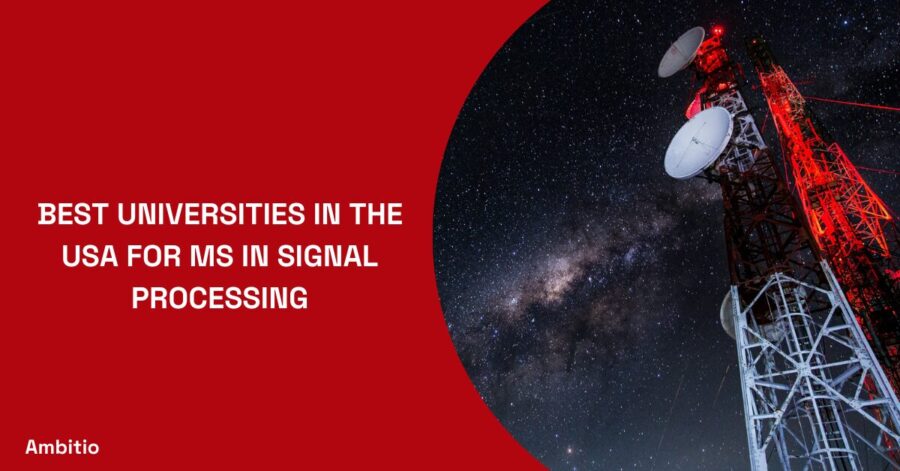12 December 2024
6 minutes read
Best Universities in the USA for MS in Signal Processing

Key Takeaways
- Academic Excellence: Top universities offer advanced signal processing knowledge.
- Career Versatility: Opportunities span various industries for graduates.
- Innovation: MS programs encourage significant research contributions.
- Global Networking: Studying in the USA provides worldwide professional connections.
- Financial Support: Scholarships and fellowships make education accessible.
What is Signal Processing?
Signal processing is an essential branch of engineering focusing on analyzing, modifying, and synthesizing signals—varied physical quantities that carry information.
This field applies mathematical and computational techniques to interpret and manipulate signals in various forms, including audio, video, and biological data.
DID YOU KNOW?
The average annual salary for a Signal Processing Engineer in the USA is $102,000, demonstrating the high demand and value of this expertise in the job market.
Why Pursue an MS in Signal Processing?

- Relevance in the Digital Age: The digital era’s demand for efficient data processing makes signal processing increasingly important. An MS in this field equips you to handle these modern challenges.
- Career Opportunities: With its applicability across telecommunications, healthcare, and more, signal processing offers diverse career paths. It opens doors to industries like machine learning, data science, and robotics.
- Innovation and Research: The field is ideal for those interested in developing new technologies and conducting groundbreaking research.
- Theory and Practice: A master’s program in signal processing melds theoretical knowledge with practical application, preparing you for real-world challenges.
- High Earning Potential: Specialists in signal processing often enjoy higher salaries due to their sought-after skills.
- Global Networking: Studying, especially in the USA, provides a global perspective and valuable international networks.
- Academic Advancement: It’s an excellent stepping stone for further study, such as a PhD, especially for those aiming for academic or advanced research careers.
Top List of Universities in the USA for MS in Signal Processing

| University | MS Program Focus | Estimated Annual Fees (USD) |
|---|---|---|
| Massachusetts Institute of Technology (MIT) | Advanced algorithms, stochastic processes | $53,790 |
| Stanford University | Digital signal processing, systems engineering | $55,473 |
| University of Illinois at Urbana-Champaign | Communication systems, signal processing algorithms | $34,386 (out-of-state) |
| Georgia Institute of Technology | Communications and signal processing | $31,370 (out-of-state) |
| University of California, Berkeley | Signal processing and communications, image processing | $29,754 (out-of-state) |
| University of Michigan, Ann Arbor | Signal and image processing, machine learning | $52,098 (out-of-state) |
| California Institute of Technology (Caltech) | Digital signal processing, computational techniques | $54,570 |
| Carnegie Mellon University | Signal processing theory, applications in engineering | $48,500 |
| University of Texas at Austin | Wireless communications, digital signal processing | $20,900 (out-of-state) |
| University of Southern California | Digital signal processing, communication signal processing | $47,880 |
Courses to Study in MS in Signal Processing
| Course Title | Description |
|---|---|
| Digital Signal Processing | Covers fundamental principles of digital signal processing, including analysis and design of discrete-time systems. |
| Statistical Signal Processing | Focuses on statistical methods for processing and interpreting signals, including estimation and detection theory. |
| Adaptive Signal Processing | Explores algorithms for adaptive filtering and their applications in various signal processing domains. |
| Signal Processing for Communications | Examines signal processing techniques specifically tailored for communication systems, such as modulation and coding. |
| Machine Learning for Signal Processing | Introduces machine learning algorithms and their applications in signal processing, including neural networks and deep learning. |
| Image and Video Processing | Deals with signal processing techniques for image and video data, including compression and enhancement. |
| Audio Signal Processing | Focuses on processing and analysis of audio signals, encompassing topics like noise reduction and speech processing. |
| Wireless Communication Systems | Studies the principles of wireless communications, emphasizing the role of signal processing in system design. |
| Array and Multichannel Signal Processing | Covers the theory and application of processing signals captured from multiple sensors or arrays. |
| Advanced Topics in Signal Processing | A course that varies by institution, offering in-depth study in a specialized area of signal processing. |
Scholarship Opportunities for MS in Signal Processing

Pursuing an MS in Signal Processing in the USA can be financially challenging, but various scholarship opportunities can help alleviate this burden. Here’s a rundown of the types of scholarships available and tips on how to secure them:
Types of Scholarships
University-Specific Scholarships:
- Many universities offer scholarships directly to their graduate students.
- These can be merit-based, need-based, or department-specific.
Government-Funded Scholarships:
- Offered by government bodies, these scholarships often aim to promote cultural exchange and academic excellence.
- Examples include the Fulbright Program for international students.
Private and Corporate Scholarships:
- Corporations or private foundations often sponsor scholarships, sometimes targeting specific fields like engineering or signal processing.
- They might have specific criteria like academic excellence, leadership qualities, or community involvement.
Research Fellowships and Grants:
- For students engaged in research, fellowships or grants can provide funding.
- These are often available through universities or external research institutions.
International Student Scholarships:
- Specifically designed for students from abroad, these scholarships can help offset the higher tuition fees faced by international students.
- They may be offered by universities, governments, or private organizations.
Tips for Securing Scholarships
Start Early:
- Begin your scholarship search well in advance of your intended start date.
- Some scholarships have early application deadlines.
Meet All Eligibility Requirements:
- Carefully review the eligibility criteria for each scholarship.
- Ensure you meet all the requirements before applying.
Craft a Strong Application:
- Tailor your application to highlight your strengths and alignment with the scholarship’s goals.
- Include a well-written personal statement, letters of recommendation, and a solid academic record.
Research Widely:
- Look for scholarships at various sources – universities, government websites, private organizations, and scholarship databases.
Apply to Multiple Scholarships:
- Don’t limit yourself to one opportunity; apply for as many scholarships as you qualify for.
- This increases your chances of receiving financial support.
Maintain Academic Excellence:
- Many scholarships are merit-based, so maintaining a high GPA is crucial.
- Engage in extracurricular activities and leadership roles to strengthen your application.
Seek Advice and Guidance:
- Consult with academic advisors or scholarship offices at your university for guidance.
- They can provide valuable insights and tips for a successful application.
Scholarships can significantly reduce the financial burden of a graduate program and allow students to focus on their studies and research. It’s important to take advantage of these opportunities and prepare a strong application to enhance your chances of securing financial support for your MS in Signal Processing.
Exploring Job Prospects and Salary Expectations
| Career Role | Description | Average Annual Salary (USD) |
|---|---|---|
| Signal Processing Engineer | Design and improve signal processing systems and algorithms. | $102,000 |
| Communications Engineer | Work on the development and maintenance of communication systems. | $97,000 |
| Data Scientist (Signal Processing) | Apply signal processing techniques to analyze and interpret data. | $120,000 |
| Audio Signal Processing Engineer | Specialize in processing signals for audio applications. | $95,000 |
| Biomedical Signal Processing Engineer | Apply signal processing methods to biomedical data and devices. | $105,000 |
| Research Scientist (Signal Processing) | Conduct research and develop new technologies in signal processing. | $115,000 |
| Systems Engineer (Signal Processing) | Integrate signal processing systems into larger systems and products. | $110,000 |
| Machine Learning Engineer (Signal Processing) | Utilize signal processing techniques in machine learning applications. | $125,000 |
| Algorithm Developer (Signal Processing) | Develop and optimize algorithms for processing signals. | $108,000 |
| Telecommunications Analyst | Analyze and improve telecommunications systems using signal processing. | $92,000 |
Eligibility Requirements for MS in Signal Processing
Pursuing a Master of Science (MS) in Signal Processing typically requires meeting certain eligibility criteria. These requirements are essential to ensure that candidates are prepared for the rigors of an advanced degree in this technical field. Here’s an overview of the common eligibility requirements:
Academic Background
- Bachelor’s Degree: Applicants must have a bachelor’s degree in engineering, computer science, mathematics, or a related field. This ensures a foundational understanding of key concepts necessary for advanced study in signal processing.
- Grade Point Average (GPA): A minimum GPA is often required, usually around 3.0 on a 4.0 scale or equivalent. Some competitive programs may require higher GPAs.
Standardized Tests
- Graduate Record Examination (GRE): Most universities in the USA require GRE scores. They typically look at quantitative, verbal, and analytical writing scores to assess the applicant’s readiness for graduate-level work.
- English Language Proficiency: For non-native English speakers, English proficiency tests like TOEFL or IELTS are required. Minimum score requirements vary by university.
Relevant Experience and Skills
- Research Experience: Some programs prefer or require candidates to have research experience, particularly in areas related to signal processing.
- Technical Skills: Proficiency in programming languages (like MATLAB, Python, or C++), and a strong mathematical background, are often essential.
- Letters of Recommendation: Applicants need to provide letters of recommendation, preferably from academic or professional references who can vouch for their qualifications and potential in the field.
Statement of Purpose and CV/Resume
- Statement of Purpose: This is a critical component of the application where candidates articulate their academic and professional goals, and how the MS program aligns with these objectives.
- Curriculum Vitae (CV) or Resume: A detailed CV or resume showcasing academic achievements, projects, work experience, and any publications or presentations is usually required.
Note: Each university and program may have its own specific set of requirements, so prospective students need to check the details provided by the institutions they are interested in. Meeting these eligibility criteria is the first step towards embarking on an advanced academic journey in the field of signal processing.
Conclusion
The pursuit of an MS in Signal Processing in the United States offers a blend of academic excellence, practical experience, and career opportunities. The universities discussed here represent the pinnacle of education in signal processing, each offering unique strengths and specializations.
As technology continues to advance, the demand for skilled professionals in signal processing will only grow, making this an opportune time to embark on this educational journey.
Take control of your future by tailoring your educational or career choices with Ambitio’s Shortlist Builder. This powerful feature allows you to filter, compare, and prioritize options based on your personal criteria, enabling you to shape your destiny with informed and strategic decisions.
FAQs
How important is work experience for admission to these programs?
While not always mandatory, relevant work experience can strengthen your application, especially in competitive programs.
Are part-time or online options available for these programs?
Some universities offer part-time or online options, catering to working professionals or those unable to relocate.
What kind of support is available for students in these programs?
Most universities offer academic advising, career services, mental health support, and networking opportunities.
Can I pursue a PhD after completing an MS in Signal Processing?
An MS degree can be a stepping stone to a Ph.D., especially if you’re interested in research and academia.
Are there opportunities for entrepreneurship within this field?
Yes, many programs encourage innovation and entrepreneurship, providing resources and mentorship for students interested in starting their ventures in technology.

You can study at top universities worldwide!
Get expert tips and tricks to get into top universities with a free expert session.
Book Your Free 30-Minute Session Now! Book a call now




























